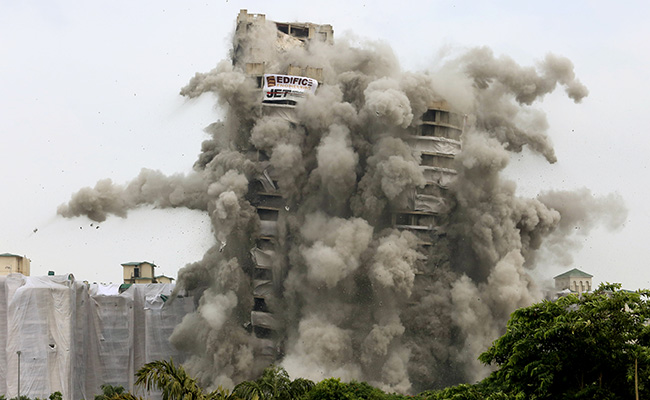
Avoid Area For Few Days if Possible: Doctors To People Living Nearby Demolished Noida Towers
NDTV
The demolition of nearly 100-metre-tall structures generated an estimated 80,000 tonnes of construction and demolition waste and sent huge clouds of dust billowing in the air.
As the nearly 100-metre-tall Supertech twin towers were razed to the ground on Sunday, doctors said people living nearby, especially those suffering from respiratory diseases, should take extra care and avoid the area for a few days if possible.
The demolition of nearly 100-metre-tall structures generated an estimated 80,000 tonnes of construction and demolition waste and sent huge clouds of dust billowing in the air. The doctors said most dust particles are 5 microns or less and can remain suspended in the air for a few days in the absence of favourable meteorological conditions like strong winds and rain. Massive dust pollution can lead to itching in the eyes, nose and skin; coughing, sneezing, breathing difficulty, lung infection, nasal congestion, asthmatic attacks and aggravate heart problems, they said.
Dr Jugal Kishore, head of Community Medicine department at the Safdarjung Hospital, said, "The dust particles will remain suspended for quite some time in case of low wind speed. People suffering from respiratory problems -- chronic obstructive pulmonary disease, asthma and bronchitis -- should avoid the area, if possible." "They should limit exposure to the affected area for at least 48 hours. Others living in and around the area should avoid exercises for a few days," he said.
Dr Jugal Kishore said people having respiratory diseases should keep taking medicine regularly and consult doctors if their problems aggravate. Dr Yudhyavir Singh, Assistant Professor, Critical Care, AIIMS, said, "Particulate matter of size smaller than 2.5 microns will be a problem. This is likely to increase episodes of coughing, sneezing, asthmatic attacks, lung infection, nasal congestion, breathing difficulty. Viruses may also piggyback the fine particles and increase infection rate, as it's the flu season." "People should take precaution and keep a buffer stock of medicines. Use N-95 masks and eyeglasses till pollutants dissipate. Wear full-sleeve clothes and avoid morning walks for a few days. Consult doctors if problems worsen," he said.
